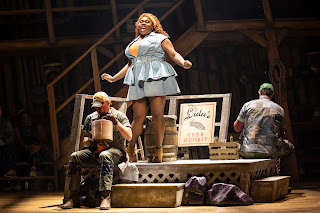Reviewed by Judd Hollander
“The past isn’t as frightening with one foot in the present.” So says a character in Scene Partners, the new comedy-drama by John J. Caswell, Jr., now at the Vineyard Theatre.
The year is 1985. Following the long-awaited passing of her abusive husband (though she refers to him in far more colorful terms), 75 year-old Meryl Kowalski (Dianne Wiest) is at last celebrating her independence. Determined to become an internationally famous film star, she heads for Hollywood and the promise of new beginning. Left behind is her former home, her drug-addicted daughter, and a lifetime of painful memories.
After a train ride to Los Angeles, with a possible detour through Russia, Meryl arrives at her destination. Determined to no longer be ignored, and thanks to some fast talking, iron determination and a loaded gun, she soon signs with an agent. From there, it’s a quick step to an acting class where she immediately bonds with the instructor, one Hugo Lockerby (Josh Hamilton). Hugo seeing in Meryl a brilliant untapped potential.
Dianne Wiest in Scene Partners. Photo by Carol Rosegg.While she is seemingly on her way and set to become a star via a documentary about her life, Meryl’s past keeps trying to intrude in her new existence. Including appearances by her late husband, who possesses the bodies of those around her. His purpose, to let Meryl know she will never be free of him. Meryl also finds herself guided by the essence of her long-lost father; who once tried to make it in show business, but failed. His attempts to do so cost him his family and for Meryl, eliminated any possibility of a happy childhood.
Scene Partners offers a lot to unpack. On one level, it focuses on how it’s never too late to follow through on your dreams. With Meryl intent on grabbing as much as can from life in the time she has left. Also stressed is the importance of being able to come to terms with the past. As well as one's subsequent actions or inactions therein.
Also explored is the need to remove oneself from those who threaten to consume you via their own self-destructive natures. Several of these points explored during a long overdue heart to heart talk between Meryl and her younger half-sister, and former actress, Charlize (Johanna Day).
Josh Hamilton in Scene Partners. Photo by Carol Rosegg.The play also offers a hilarious send-up of the world of show business. Particularly thanks to Hamilton's wonderfully over-the-top portrayal of a temperamental acting guru. He of multiple accents, with a habit of throwing cans of Diet Coke whenever he becomes angry. The scene where Meryl gets herself an agent also calls to mind similar, though not so outrageous stories, recounted in Hollywood lore from time to time.
However as things progress, one starts to wonder how much of the story is only taking place in Meryl's mind. As she has begun to show signs of a medical condition which may be warping her perceptions of reality. This not only adds an extra layer of context to the play, but also increases Meryl urgency to realize her goals. It’s a testament to the script that just when you think you’ve figured out what’s actually happening, the ground shifts just enough to make one question these assumptions.
(L-R) Dianne Wiest and Johanna Day in Scene Partners. Photo by Carol Rosegg.Wiest gives a fantastic performance as a woman determined to make it in a business where so many others have failed. Including several in her own family. The way she juggles her character's different emotional situations - ones ranging from anger and determination to happiness and introspection - comes across very, very well. All the while never making Meryl an object of ridicule.
It must also be pointed out that this is not a perfect show. The use of various video clips and TV monitors, coupled with possible non-linear sequences, can at times feel rather disjointed. In addition, the opening and closing scenes of the play feel somewhat dragged out. Also a scene where Meryl recounts her life story, as told via several other cast members, would have worked better if shortened somewhat.
The cast, many of whom play multiple rules, all do strong work here. Rachel Chavkin’s direction, like the play itself, moves in fits and starts.
(L-R) Dianne Wiest and Eric Berryman in Scene Partners. Photo by Carol Rosegg.Part tale of rebirth and new beginnings, part performance/multi-media piece, “Scene Partners” leaves one with much to ponder. Thanks to an interesting idea and a standout turn by Wiest.
Featuring: Eric Berryman (Chuck + Others), Johanna Day (Charlize), Josh Hamilton (Hugo + Others), Carmen M. Herlihy (Cassie + Others), Kristen Sieh (Pauline + Others), Dianne Wiest (Meryl Kowalski).
Scene
Partners
A New Play by John J. Caswell, Jr.
Scenic
Design: Riccardo Hernández
Costume
Design: Brenda Abbandandolo
Lighting
Design: Alan C. Edwards
Sound
Design: Leah Gelpe
Video
& Projection Design: David Bengali
Hair,
Wig & Makeup Design: Leah Loukas
Props
Supervisor: Andrew Diaz
Video
Producer: Anne Troup
Fight
Choreographer: J. David Brimmer
Tapestry
Design: Patricia Marjorie
Music
Director: Nehemiah Luckett
Choral
Arranger: Orion Johnstone
Dialect
Coach: Beth McGuire
Directed
by Rachel Chavkin
Vineyard
Theatre
108 East
15th Street
Tickets:
212-353-0303 or https://Vineyardtheatre.org/shows/scene-partners
Running
time: 1 hour, 45 minutes, no intermission
Closes:
December 17, 2023










,%20Andrew%20Burnap%20and%20the%20company%20in%20Lincoln%20Center%20Theater's%20production%20of%20CAMELOT.%20Credit%20to%20Joan%20Marcus.jpg)


%20and%20company%20in%20Lincoln%20Center%20Theater's%20production%20of%20CAMELOT.%20Credit%20to%20Joan%20Marcus.jpg)




.jpg)

